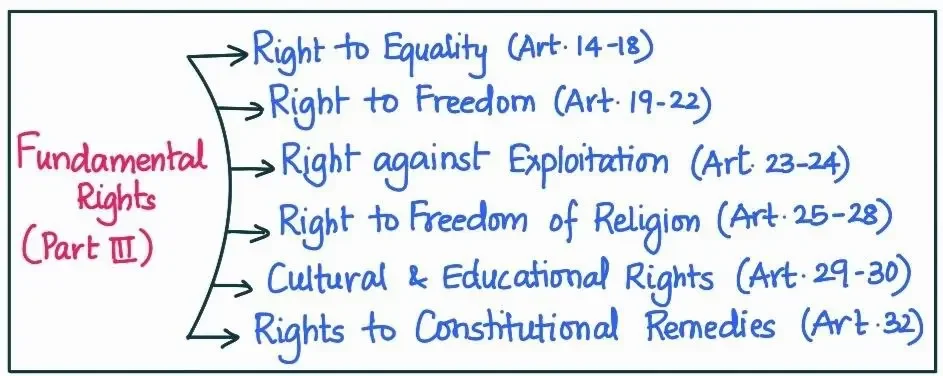![]() March 27, 2024
March 27, 2024
![]() 4729
4729
![]() 0
0
Exploring the Elaborate Framework of Fundamental Rights
Fundamental Rights, enshrined in Part III of the Indian Constitution (Articles 12-35), constitute the bedrock of individual liberties and freedoms. These are fundamental for all round (material, intellectual, moral and spiritual) development. These were inspired by the Constitution of the USA (Bill of Rights). Fundamental Rights in India are more elaborate than those found in any other country in the world, including the USA. It has been rightly described as the Magna Carta of India.
Fundamental Rights Enshrined in the Constitution: Key Rights in our Constitution

Right to Equality (Article 14-18)
Right to Freedom (Article 19-22)
Right Against Exploitation (Article 23-24) [UPSC 2017]
Right to Freedom of Religion (Article 25-28)
Cultural and Educational Rights (Article 29-30)
Right to Constitutional Remedies (Article 32): Right to move the Supreme Court for enforcement of fundamental rights, including the writs of Habeas corpus, Mandamus, Prohibition, Certiorari, and Quo Warranto. (under Article 32: Part of basic structure). |
Fundamental Rights available
|
Definition of State (Article12)
| Article/Part | Description |
| Article 265/Part XII | No tax shall be levied or collected except by authority of law. |
| Article 300-A/Part XII | No person shall be deprived of his property save by authority of law. |
| Article 301/Part XIII | Trade, commerce and intercourse throughout the territory of India shall be free. |
| Article 326/Part XV | Adult Suffrage (Right to Vote): Constitutional right. [UPSC 2017] |
Comparison between Fundamental Rights, Directive Principles, and Fundamental Duties
| Fundamental Rights | DPSP | Fundamental Duties |
|
|
|
Right to Vote (Constitutional Right)
| Must Read | |
| Current Affairs | Editorial Analysis |
| Upsc Notes | Upsc Blogs |
| NCERT Notes | Free Main Answer Writing |
Exceptions to Fundamental Rights
Article 31B:
Note: Both articles 31 A and 31 B are inserted by Constitution (First Amendment) Act, 1951
Conclusion
<div class="new-fform">
</div>

Latest Comments